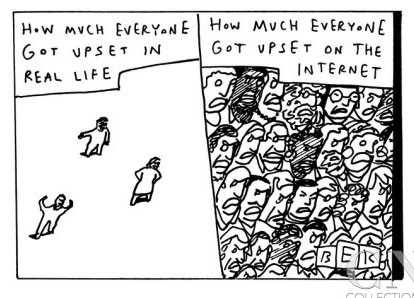
One of the themes we’ve been exploring these past few months in our weekend columns, as well as a few isolated posts, is the palpable rise in censoriousness that has been making itself felt on social media and in certain higher education settings. According to voices on all sides of the ideological equation, a resurgent devotion to “political correctness” is creating a situation where the institutions charged with promoting open dialogue in a liberal society–academia and journalism–are in fact squashing it.
Chris Rock described the state of things memorably in his recent interview with New York Magazine, admitting that he refuses to perform on liberal arts campuses anymore, that those crowds have a sense of humor roughly on par with fundamentalist Christian ones, i.e. nonexistent. “You can’t even be offensive on the way to being inoffensive” is how Rock put it. Certainly the growing list of (mildly) controversial figures who have had to renege on university speaking engagements over the past couple years due to student protests would affirm Rock’s assessment. The parameters of acceptable opinion/usage appear to be narrowing by the day.
 The problem in even bringing any of this up is that it’s almost impossible to ‘engage’ and not sound like you’re adopting a different version of the same victimhood mentality that is keeping more and more people hamstrung in a web of self-righteousness and fear. This is one of the reasons why the news that Andrew Sullivan is stepping down from The Dish is so sad; few have done more to stand up for genuine liberalism than he and his staff, especially in relation to Christianity. But it’s also the reason why Jonathan Chait’s editorial for New York Magazine (!) this past week, “Not a Very P.C. Thing to Say” came as such a pleasant surprise. He unpacks our predicament with precision, thoughtfulness, and extraordinary tact, acknowledging that we’ve been here before–one professor he interviews asks, “how did we get back to 1991?”–but resisting the trap of a new but equally intoxicating kind of victimhood (i.e. “poor me/us!”). All the examples of down-shouting Chait mentions are fascinating, but if the word “microaggression” gives you the heebie-jeebies, I’ve reproduced some of the main points:
The problem in even bringing any of this up is that it’s almost impossible to ‘engage’ and not sound like you’re adopting a different version of the same victimhood mentality that is keeping more and more people hamstrung in a web of self-righteousness and fear. This is one of the reasons why the news that Andrew Sullivan is stepping down from The Dish is so sad; few have done more to stand up for genuine liberalism than he and his staff, especially in relation to Christianity. But it’s also the reason why Jonathan Chait’s editorial for New York Magazine (!) this past week, “Not a Very P.C. Thing to Say” came as such a pleasant surprise. He unpacks our predicament with precision, thoughtfulness, and extraordinary tact, acknowledging that we’ve been here before–one professor he interviews asks, “how did we get back to 1991?”–but resisting the trap of a new but equally intoxicating kind of victimhood (i.e. “poor me/us!”). All the examples of down-shouting Chait mentions are fascinating, but if the word “microaggression” gives you the heebie-jeebies, I’ve reproduced some of the main points:
…large segments of American culture have convulsed into censoriousness. In a short period of time, the p.c. movement has [re-]assumed a towering presence in the psychic space of politically active people in general and the left in particular. “All over social media, there dwell armies of unpaid but widely read commentators, ready to launch hashtag campaigns and circulate Change.org petitions in response to the slightest of identity-politics missteps,” Rebecca Traister wrote recently in The New Republic.
Political correctness is a term whose meaning has been gradually diluted since it became a flashpoint 25 years ago. People use the phrase to describe politeness (perhaps to excess), or evasion of hard truths, or (as a term of abuse by conservatives) liberalism in general. The confusion has made it more attractive to liberals, who share the goal of combating race and gender bias. But political correctness is not a rigorous commitment to social equality so much as a system of left-wing ideological repression. Not only is it not a form of liberalism; it is antithetical to liberalism. Indeed, its most frequent victims turn out to be liberals themselves.
Political correctness makes debate irrelevant and frequently impossible. Under p.c. culture, the same idea can be expressed identically by two people but received differently depending on the race and sex of the individuals doing the expressing. This has led to elaborate norms and terminology within certain communities on the left. For instance, “mansplaining,” a concept popularized in 2008 by Rebecca Solnit, who described the tendency of men to patronizingly hold forth to women on subjects the woman knows better — in Solnit’s case, the man in question mansplained her own book to her. The fast popularization of the term speaks to how exasperating the phenomenon can be, and mansplaining has, at times, proved useful in identifying discrimination embedded in everyday rudeness. But it has now grown into an all-purpose term of abuse that can be used to discredit any argument by any man… Mansplaining has since given rise to “whitesplaining” and “straightsplaining.”
If a person who is accused of bias attempts to defend his intentions, he merely compounds his own guilt. (Here one might find oneself accused of man/white/straightsplaining.) It is likewise taboo to request that the accusation be rendered in a less hostile manner. This is called “tone policing.” If you are accused of bias, or “called out,” reflection and apology are the only acceptable response — to dispute a call-out only makes it worse. There is no allowance in p.c. culture for the possibility that the accusation may be erroneous. A white person or a man can achieve the status of “ally,” however, if he follows the rules of p.c. dialogue. A community, virtual or real, that adheres to the rules is deemed “safe.” The extensive terminology plays a crucial role, locking in shared ideological assumptions that make meaningful disagreement impossible…
The p.c. style of politics has one serious, possibly fatal drawback: It is exhausting. Claims of victimhood that are useful within the left-wing subculture may alienate much of America… Nor does it bode well for the movement’s longevity that many of its allies are worn out. “It seems to me now that the public face of social liberalism has ceased to seem positive, joyful, human, and freeing,” confessed the progressive writer Freddie deBoer. “There are so many ways to step on a land mine now, so many terms that have become forbidden, so many attitudes that will get you cast out if you even appear to hold them. I’m far from alone in feeling that it’s typically not worth it to engage, given the risks.” Goldberg wrote recently about people “who feel emotionally savaged by their involvement in [online feminism] — not because of sexist trolls, but because of the slashing righteousness of other feminists.” Former Feministing editor Samhita Mukhopadhyay told her, “Everyone is so scared to speak right now.”
I remember talking to a professor at an elite college recently. She told me that the ‘language’ her graduate students are inevitably most conversant in when they arrive at her door is the language of offense. Apparently the majority of classroom discussions, especially toward the beginning of the semester, would funnel down to the offense vs. safety dichotomy, which she always tried to avoid as it would shut down discussion. She told me that she felt like she’d succeeded if, by the end of the term, she had given her students at least one other filter through which to parse what they were learning. Hmmm…
We’ve talked about this elsewhere. In fact, some might say it’s all we talk about. The real issue is not propriety so much as purity. We are deriving a sense of righteousness from our ability to be adequately inclusive/tolerant/progressive–in language if nothing else. It’s not so different from what you see in certain legalistic religious circles, especially the “church of one” doctrinal hairsplitting strands so endemic to Protestantism. Some of the parallels are downright uncanny.
So psychologically, what’s at stake appears to be righteousness, not progress. What else could account for the merciless policing of one’s friends/colleagues? (As in church circles, the people getting hurt are more often than not on the inside, not the outside). We do this because it feels good. Really good–and powerful, too. For a little while, that is, until we find ourselves on the other side of the maximum-strength taser, which we inevitably will, human nature being what it is.
 The clear takeaway from the experts (Hannah Rosin et al) is, when it comes to correctness, there is no ‘enough’. The bar keeps moving, which is one reason why the pursuit of
The clear takeaway from the experts (Hannah Rosin et al) is, when it comes to correctness, there is no ‘enough’. The bar keeps moving, which is one reason why the pursuit of holiness correctness results in such burnout. No perfectly inoffensive language exists because no perfectly inoffensive people do. This doesn’t mean that some words or practices aren’t more hurtful or destructive than others–of course not–but even if there were a purified vocabulary for us all to use, we could talk until we were blue in the face, and our attitudes wouldn’t necessarily soften. The internal bigotry which is our common lot cannot be transformed into something unbiased by force. A change of heart cannot be coerced. In fact, leverage often makes things worse–just google “Yik Yak college” if you want an indication of the unvarnished feeling on these campuses.
In the intro to A Mess of Help I tried to spell some of this out, albeit in slightly different terms. Substitute “Cool” for “Correctness” and the observation stands:
Oftentimes, the ‘secular’ world is viewed as an escape from the oppressive moral strictures of religion. Which it sometimes can be, for a stretch. And yet, as a number of the essays contained herein will testify, the ‘secular’ world can be just as condemning and judgmental, if not more so, as the religious one. The Law of Cool, for instance, often turns out to be a crueler taskmaster than the Law of God—the latter at least has the benefit of not being a moving target.
As much as we might wish it were not the case, we do not escape guilt or self-righteousness by leaving church—law is not an exclusively religious reality but a human one, as is the response to it: Faced with the nagging failure to be or do ‘enough’, we rebel and rationalize, hiding our true selves and wondering whether, and where, assistance is to be found.
Where indeed. Or should I say, who.
https://www.youtube.com/watch?v=ENC5MEzrRp8

COMMENTS
7 responses to “How Did We Get Back to 1991?”
Leave a Reply














Reading responses to Chait has been entertaining and I think you get closer to what’s going on behind PC than most. Chait makes a mistake that PC ebbed after the early 90’s. What happened is it defeated its adversary in the culture wars. Now those who were among the original vangaurd in the 90’s are seeing how the next generation are taking the principle to a logical further extreme. And it’s that older generation that is suddenly realizing the Frankenstein’s monster for what it is.
It reminds me of Dostoyevsky’s lesser known novel The Devils which was a novelistic response to what was occuring among the newer generation of Russian radicals in the late 19th century. This younger generation contemptuously disgarded the older generation of genteel liberals (a la Turgenev) for a more purely and calculatedly power centered ideology. These were the first nihilists. It was this generation that inspired Lenin and his circle.
If I were to assign a root cause it would be that both Chait’s kind of liberalism and Turgenev’s were a form of naive overly realized eschatology. Such forms of ideology make promises that prove to be impossible. But the next generation of followers, having based their identity on these promises convince themselves that the aspiration is legitimate, the older generation just didn’t go far enough. Ideology then provides the noble vision that justifies our sinful yearning for Will to Power. To become like God.
Like most of humanities tragic spiritual distortions, this one goes back to the garden.